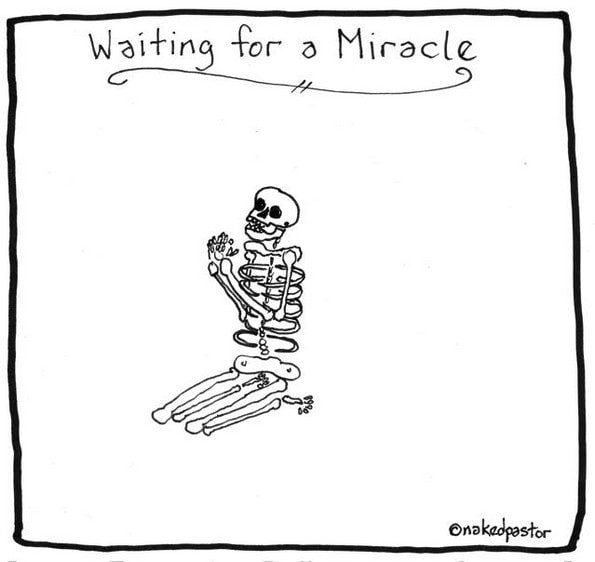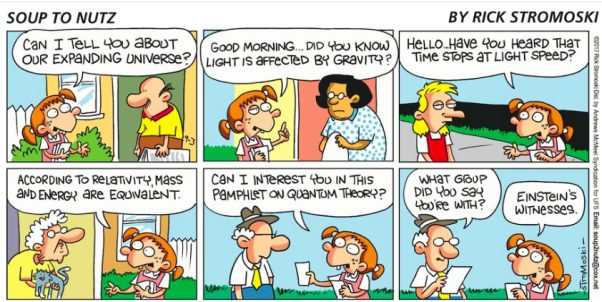
One of the thorniest verses in the Bible for Evangelicals is John 14:12:
Verily, verily, I say unto you, He that believeth on me, the works that I do shall he do also; and greater works than these shall he do; because I go unto my Father.
Evangelicals believe that the fourteenth chapter of John is the very words of Jesus. This chapter tells Evangelicals not to have a troubled heart; that 2,000 years ago Jesus ascended back to heaven to prepare a room/mansion in Heaven for them. When they die or if the Rapture happens before they die, Evangelicals are promised the keys to a brand new home in the sky. This chapter also tells Evangelicals that Jesus is THE Way, THE Truth, and THE Life, proving to Evangelicals the exclusivity of their peculiar version of the Christian gospel.
In verse 14 Jesus says, If ye shall ask any thing in my name, I will do it. Ponder these words for a moment. Think about all the prayers Christians have uttered over the centuries, prayers asked in the name of Jesus with nary a response. Think about this verse in light of the current Coronavirus Pandemic. Evangelicals love to say that God answered this or that prayer, but pressed for evidence of their supernatural claims, they quickly retreat to the safe confines of faith. (Please see A Few Thoughts on a Lifetime of Praying to the Christian God.)
Let’s do some Bible math:
If ye shall ask any thing in my name, I will do it + He that believeth on me, the works that I do shall he do also; and greater works than these shall he do = a church that should regularly see people raised from the dead and healed; a church that should be able to feed the hungry; a church whose leaders work miracles, including walking on water, turning water into Welch’s grape juice, and healing the deaf, blind, and dumb. Add to this, Jesus also said in Mark 16:15-18:
And he said unto them, Go ye into all the world, and preach the gospel to every creature. He that believeth and is baptized shall be saved; but he that believeth not shall be damned. And these signs shall follow them that believe; In my name shall they cast out devils; they shall speak with new tongues; They shall take up serpents; and if they drink any deadly thing, it shall not hurt them; they shall lay hands on the sick, and they shall recover.
According to Jesus, those who believe in him will cast out devils, speak in unlearned new languages, handle venomous snakes, drink poison and not die, and lay their hands on the sick, miraculously causing them to recover from their illnesses.
Is it not then fair to ask where such Christians are today? Where can a non-believer go to see Christians doing greater works than Jesus? Why are hospital beds not empty, mental hospitals closed down, and world hunger eliminated? Surely if, as the Bible says, Christians are to do works greater than Jesus, we skeptics have the right to say show us.
Most Christian sects come up with elaborate schemes to explain away the normative meaning of these verses. The works of Jesus and the early church were sign gifts, many Evangelicals say, and once the canon of Scripture was completed these sign gifts were no longer necessary. I wonder if Christians who say this ever consider that what they are basically saying is that Jesus was lying in John 15/Mark 16 or that there should no longer be the expectation of verifiable miracles. (I use the word verifiable to turn away those who want to appeal to all sorts of subjective experiences that they say are evidence of God working m-i-r-a-c-l-e-s.)

In the delusional world inhabited by Pentecostals, snake-handling Baptists, and those who subscribe to CHARISMA magazine, greater works than Jesus’ are being performed regularly. When asked for verifiable evidence for their claims, appeals are made to faith, or Christians mutter, “I just KNOW that MY GOD is in the miracle-working business.” Funny business God is in . . . no advertising or place of business, yet non-Christians are expected to believe the business exists. I know there is a McDonald’s right here, says the Charismatic because a book I read tells me there is.
Here’s my challenge to Evangelicals. Please pray that God supernaturally heals me from my physical maladies, or that God stops the Coronavirus Pandemic in its tracks. If she does, I will believe and recant every word I’ve ever written about the Bible, God, Jesus, and Christianity. Wouldn’t it be a great testimony to the miraculous power of almighty God and the veracity of the Christian narrative if God healed an atheist such as me? Instead of praying for God to kill me, why not pray for God to heal me? Better yet, forget me. Heal my wife. I’m waiting . . .
Bruce Gerencser, 66, lives in rural Northwest Ohio with his wife of 45 years. He and his wife have six grown children and thirteen grandchildren. Bruce pastored Evangelical churches for twenty-five years in Ohio, Texas, and Michigan. Bruce left the ministry in 2005, and in 2008 he left Christianity. Bruce is now a humanist and an atheist.
Connect with me on social media:
Your comments are welcome and appreciated. All first-time comments are moderated. Please read the commenting rules before commenting.
You can email Bruce via the Contact Form.


